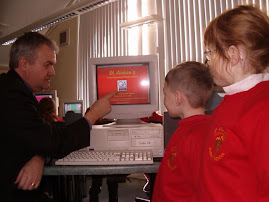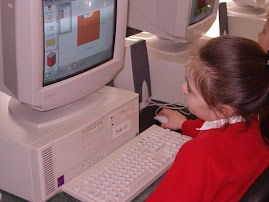Review your posts in e-activity 1 and 2. Choose one or two areas where you would like to integrate ICT in your school. Provide a rationale for the choice
Our school has set up a new computer lab and we are calling it the ICT room-strictly for teaching of science through ICT (latter we do intend to use it for other subjects as well), the school where I teach consists of three year level (Grade VII, VIII & IX) initially we are using it for Grade VII (General Science) they have 5 lessons a week two lessons in the Science laboratory for Practical activities & Experiments, two lessons in class room for theory, tests and Quizzes and one lesson in the ICT room-In the ICT room I do intend to teach through power point presentation and also create a Blog, the blog shall have announcement, assignment and assessment result posted on it.
Choose an ICT tool to conduct needs assessment for the project. Provide a rationale for selecting the tool
Throughout the world, information and communications technology (ICT) is changing the face of education. Two fundamental and complementary factors are at work. First, ICT is changing the nature of work and the workplace, and education systems must respond to this. The so-called "knowledge revolution", combined with economic globalization, create conditions which strongly reward those countries that focus growth on knowledge-based industries. A prerequisite for this is an educated labour force of computer-literate individuals who themselves understand and can harness the power of the ICT revolution. More generally, every citizen in this and the next generation will need to have a high "comfort level" with technology to live in and contribute to a society increasingly part of an interdependent "wired world". So ICT is changing the objectives of education.
Second, ICT provides educators with a powerful new tool to enhance the learning opportunities for students and the professional development opportunities for teachers. Thus ICT is also changing the methodologies through which educational services are delivered.
But, like all, powerful tools, ICT can do as much harm as good. Bad pedagogy implemented on a computer may have its harmful effects multiplied many fold by the power of the technology. Educational leaders and planners thus bear a heavy responsibility to ensure that the introduction of ICT into the classroom is managed with great care so that the very real benefits are realised efficiently and effectively, while the dangers are eliminated, or at least minimised. Careful planning, in the context of a long-term educational vision, is therefore essential.
Moreover, the introduction and sustainability of ICT in the education system is expensive. The capital cost of the equipment needed to begin the process is obvious. Not so well understood is the high level of new recurrent costs that effective use of ICT requires on a continuing basis.
The central focus of ICT in education is on the use of the computer. In this context the computer, as a piece of hardware animated by a variety of software packages, must be viewed as a multi-purpose device whose educational applications include:
Manipulating text and numerical data (word processing, spreadsheets, statistical and mathematical software, desktop publishing)
Manipulating graphic information (scanning and drawing software)
Storing and analysing digitized information (databases)
Accessing and disseminating information (world wide web, CD-ROMs)
Communicating (e-mail, listservs, chatrooms, e-fax, real-time conferencing, etc.)
Instructional processes (software for teaching specific skills)
I do intend to use a blog as an ICT tool, firstly I need to convince my fellow teachers (colleague) to use it, how effective it is and how interesting it could be both for students as well as for us teachers-the blog will create an interest towards the subject and all information relating to the subject will be displayed, teachers could give assignment and students could answer them also give comments – assessment could also be done through the blog, this way there will be a close interaction between teacher and student.
Develop your needs assessment method and share your plan
I would share my blog with the students and also ask them to create one, then I would ask questions through the blog, the questions will be related to topics taught also some activities, assignment and project work will be displayed-the students could give there comments and I could assess them on what they have answered also I would visit there blog regularly and give my suggestion and comments-I intend to work this with all the sections and maintain a record and share it with other teachers and the HOD-also try and provide some incentive to students who have been working regularly this should encourage or motivate the students to take keen interest in the subject.
Conduct needs assessment exercise and present your findings
The need analysis process is a series of activities conducted to identify problems of other issues in the work place and to determine whether training is an appropriate response. A need analysis is usually the first in the series of steps implemented to encourage effective change. This is mainly because a needs analysis specifically defines the gaps between current and desired organizational and individual performances.
Reflect on the experience of using ICT for needs assessment.
Yes, it was and is a good experience of using ICT, I did create blog in teaching of general science (grade 7), which has helped me and my students. All information about the syllabus content, activities and above all the up coming project work was all displayed on the blog and students could get first hand information. Beside using the blog I also used a tutorial CD, and students did attempt some questions on multiple choice (MCQ's) which was good for self evaluation and as usual in every class there was a power point presentation on topic taught, so all in all a good experience and students did enjoy this technique of using ICT-I do intend to improve on it and continue using ICT in my teaching in future as well.
Friday, August 31, 2007
Friday, August 10, 2007
Why Do Teachers Resist Using ICT?

Why Do Teachers Resist Using ICT?
Latest Poll Results By Terry Freedman
Why are many teachers reluctant to use ICT in their lessons. Here are the latest results from the poll I set up to find out.It's based upon the opinions of about 80 people, and no it isn't scientific. It's intended purely asa starting point for debate.
The least important factor was a fear of what students might get up to if they were to be given access to the technology.asked this question, suggested some answers, and gave readers the opportunity to have their say in the form of an online poll. I've got some interesting results to share with you.
Teaching chartsBecta will be disappointed to learn that the single biggest #1 reason is that teachers cannot see the net benefit of using computers. That was cited by nearly 50% of the respondents as the primary reason for not using technology in their lessons.The most-cited second reason was unreliable networks, which at nearly 20% of the respondents tied with "too difficult to learn".In third place (nearly a quarter of the responses) comes "too difficult to learn" once again.These results should make us concerned in themselves, but we get an even more interesting result when we look at the cumulative totals. (Remember, respondents were asked to give their top 7 reasons for teachers' reluctance to embrace educational technology.)The least important factor, apart from "Other", was a fear of what students might get up to if they were to be given access to the technology, whilst one of the largest was lack of access to personal computing.If you'd like to put your two pence-worth in, read the article and then take part in the poll, or just go straight to the poll -- it takes 2 minutes to complete. Go on, contribute to the debate.
Teaching chartsBecta will be disappointed to learn that the single biggest #1 reason is that teachers cannot see the net benefit of using computers. That was cited by nearly 50% of the respondents as the primary reason for not using technology in their lessons.The most-cited second reason was unreliable networks, which at nearly 20% of the respondents tied with "too difficult to learn".In third place (nearly a quarter of the responses) comes "too difficult to learn" once again.These results should make us concerned in themselves, but we get an even more interesting result when we look at the cumulative totals. (Remember, respondents were asked to give their top 7 reasons for teachers' reluctance to embrace educational technology.)The least important factor, apart from "Other", was a fear of what students might get up to if they were to be given access to the technology, whilst one of the largest was lack of access to personal computing.If you'd like to put your two pence-worth in, read the article and then take part in the poll, or just go straight to the poll -- it takes 2 minutes to complete. Go on, contribute to the debate.
So why aren't you doing it?
ICT or educational technology? John Cuthell suggested a few ideas, which I've built on and incorporated in a poll (also suggested by John). Read on for more details, and say what you think.These are the factors which John identified, although the commentary is mine (I don't want to put words into John's mouth!):
Unreliable network
At one school I started working at, as an ICT (Technology) co-ordinator, the computer networks were completely unreliable. They would break down for no apparent reason. Needless to say, none of the teachers would take the chance of taking a class of kids into the computer labs.There were two reasons for the breakdowns. One of the networks was easy to diagnose: it was ancient, using a computer known as a 480z (and it even included a 380z). The more modern network was unreliable because there was a faulty wire inside the wall. Once these two issues, especially the faulty wiring, were sorted out, we were cooking. Well, it was a very slow cook but at least we'd got started.
No access to personal computing
Nobody can be expected to fully understand the benefits of educational technology if they don't have access to it when they need it, and for their own personal use. That's why the UK's Laptop for Teachers scheme was such a good idea, despite its limitations because of financial considerations.
Technical lockdown that prevents innovation
I think we've all been in the situation where the technical support staff seem to be more concerned with security than innovation and learning. Ultimately, this is a senior management issue, because the Headteacher or Principal should be saying: "We want to be able to achieve X: please find a way that we can do so without compromising security." For example, if the Headteacher decides that it would be educationally beneficial for students to share videos over the internet, the technical support team should be tasked with finding a way to make that possible and safe. They should not have the authority to merely block it. This raises another issue, of course, and one which I deal with time and again in our Leading and Managing Educational Technology subscription: this is not a technical issue, but a management issue.
Distrust of what students will get up to
Quite understandable, but as long as you realise that students will always find ways of circumventing controls, you can learn to live with it by adopting three strategies. One, the school should talk to students to find out what they get up to and what the security holes are. Two, teachers must learn to use educational technology: I don't think it's good enough to keep saying "I don't understand this new-fangled stuff". I was using computers in my classroom 30 years ago: how long does something have to be around before it's no longer regarded as new? Three: if the curriculum and lessons are interesting enough, most students won't want to mess around anyway.The remaining points are mine.
Too difficult to learn
Personally, I give up on something if I can't master the basics without a manual in 5 or 10 minutes. There just isn't the time.
Poor classroom support, poor technical support, poor CPD
In essence, you can't just expect teachers to venture into the unknown with a lifeline. You need to have a support infrastructure which includes classroom assistants (and their training), technical support for when (not if) things go wrong, and support in he form of continuing professional development (CPD) opportunities.
Cannot see net benefit of using it
Teachers may be able to see the benefits, but there are also costs -- not least the risk of failing in some sense. These days, despite what anyone says, grades are everything. I think you have to be a pretty brave teacher to take chances. So, what matters here is not whether teachers think there are benefits, but whether the perceived benefits (note the word "perceived") outweigh the perceived costs.
Tuesday, August 7, 2007
Saturday, August 4, 2007
Summary of Discussion (E-Activity 1) by Ms Azra Naseem
In E-Activity 1 we asked you to share your experiences of ICT integration by answering 6 questions:
Use in Teaching – what, why and how?
Use by Students – what, why and how?
Benefits for Teaching
Benefits for Students
Benefits for School
Challenges
We noticed that almost all of you have used ICT in your teaching. The commonly used application was PowerPoint. Other applications include word processors, educational CDs, web, digital cameras, movie maker, and databases.
Qurban has used a number of multimedia software not only for teaching but also for research. Sadia shared examples of how she has used PowerPoint in her teaching. Kishwer also made her topic interesting for students by incorporating PowerPoint in her lesson. It became a source of motivation for her students. Munazza has used PowerPoint to teach the concept of solar system to grade III. Shaista uses PowerPoint and “for extracting information related to [her] subject and lesson planning [she] uses the Internet. [she] also uses word processor and spread sheets for preparing assignments, worksheets for the students.” (Re: Q 1. ICT use in Teaching - Shaista Shahab (7/17/2007 9:57AM GMT))
We also noted Nazia and Safia making a commitment to continue using ICT: “i will continue planning these kind of activities for them so that their learning can get improved.” (Re: Q 1. ICT use in Teaching - Nazia Saleem Khoja (7/10/2007 6:08AM GMT)); Safia: “in future i will continue and develope the use of ICT in my teaching.” (Re: Q 1. ICT use in Teaching - Safia Khatoon (7/21/2007 8:36AM GMT))
Your students use ICT regularly, except where they are very young and are learning basic ICT skills: For instance, we noted that Arif’s students are beginning to learn ICT skills: “lot of students can’t operate computer but this is challenge so we use ICT in class room because they use Paint and making image so” (Re: Q 2. ICT use by your Students - Arif Qureshi (7/13/2007 5:04AM GMT)).
While discussing the use of technology by students in his class, Roman made an important observation: “Our students are well equipped and well informed about computer studies infact I at times do believe that they are more informed than us teachers” (Re: Q 2. ICT use by your Students - Roman Bernard Rodrigues (7/11/2007 2:52PM GMT)). This observation has implications for the role of teacher, students and technology in class. Also, Amina made a powerful suggestion: “Is it possible that the students themselves choose a topic of their interest, related to the topics being covered under teachers guidance? This would ensure each student has an individual topic to research.” (Re: Q 2. ICT use by your Students - Amina Khalfe (7/12/2007 6:53AM GMT))
A number of benefits were highlighted. For instance,
· Encourages active participation from all students
· Develops ICT skills which students need
· Updating our knowledge, seeking ideas for teaching and enhancing content knowledge
· Sharing ideas with others and seeking their feedback
· Students’ motivation for learning is enhanced
· Efficiency is increased
· Builds students’ confidence
· Cater to mixed ability learners
· Can show processes that are not possible otherwise
· School’s prestige is increased
· Enables effective utilization of resources
Roman drew our attention to the way we use technology in class: “I guess there is not much difference in chalkboard teaching and my teaching, i feel that I have replaced the chalkboard with my powerpoint slide show-is it ICT????” (Re: Q 3. ICT benefits for Teaching - Roman Bernard Rodrigues (7/11/2007 3:05PM GMT))
A number of challenges were shared in relation to the following:
· Lack of resources
· Teachers’ preparedness to accept change
· Lack of interest among students
· Scheduling of lessons/ time
· Curriculum
· Management support
· Class management
· Own readiness to integrate ICT
We encourage you to revisit your posts and read the replies of your fellow CPs and tutors.
Use in Teaching – what, why and how?
Use by Students – what, why and how?
Benefits for Teaching
Benefits for Students
Benefits for School
Challenges
We noticed that almost all of you have used ICT in your teaching. The commonly used application was PowerPoint. Other applications include word processors, educational CDs, web, digital cameras, movie maker, and databases.
Qurban has used a number of multimedia software not only for teaching but also for research. Sadia shared examples of how she has used PowerPoint in her teaching. Kishwer also made her topic interesting for students by incorporating PowerPoint in her lesson. It became a source of motivation for her students. Munazza has used PowerPoint to teach the concept of solar system to grade III. Shaista uses PowerPoint and “for extracting information related to [her] subject and lesson planning [she] uses the Internet. [she] also uses word processor and spread sheets for preparing assignments, worksheets for the students.” (Re: Q 1. ICT use in Teaching - Shaista Shahab (7/17/2007 9:57AM GMT))
We also noted Nazia and Safia making a commitment to continue using ICT: “i will continue planning these kind of activities for them so that their learning can get improved.” (Re: Q 1. ICT use in Teaching - Nazia Saleem Khoja (7/10/2007 6:08AM GMT)); Safia: “in future i will continue and develope the use of ICT in my teaching.” (Re: Q 1. ICT use in Teaching - Safia Khatoon (7/21/2007 8:36AM GMT))
Your students use ICT regularly, except where they are very young and are learning basic ICT skills: For instance, we noted that Arif’s students are beginning to learn ICT skills: “lot of students can’t operate computer but this is challenge so we use ICT in class room because they use Paint and making image so” (Re: Q 2. ICT use by your Students - Arif Qureshi (7/13/2007 5:04AM GMT)).
While discussing the use of technology by students in his class, Roman made an important observation: “Our students are well equipped and well informed about computer studies infact I at times do believe that they are more informed than us teachers” (Re: Q 2. ICT use by your Students - Roman Bernard Rodrigues (7/11/2007 2:52PM GMT)). This observation has implications for the role of teacher, students and technology in class. Also, Amina made a powerful suggestion: “Is it possible that the students themselves choose a topic of their interest, related to the topics being covered under teachers guidance? This would ensure each student has an individual topic to research.” (Re: Q 2. ICT use by your Students - Amina Khalfe (7/12/2007 6:53AM GMT))
A number of benefits were highlighted. For instance,
· Encourages active participation from all students
· Develops ICT skills which students need
· Updating our knowledge, seeking ideas for teaching and enhancing content knowledge
· Sharing ideas with others and seeking their feedback
· Students’ motivation for learning is enhanced
· Efficiency is increased
· Builds students’ confidence
· Cater to mixed ability learners
· Can show processes that are not possible otherwise
· School’s prestige is increased
· Enables effective utilization of resources
Roman drew our attention to the way we use technology in class: “I guess there is not much difference in chalkboard teaching and my teaching, i feel that I have replaced the chalkboard with my powerpoint slide show-is it ICT????” (Re: Q 3. ICT benefits for Teaching - Roman Bernard Rodrigues (7/11/2007 3:05PM GMT))
A number of challenges were shared in relation to the following:
· Lack of resources
· Teachers’ preparedness to accept change
· Lack of interest among students
· Scheduling of lessons/ time
· Curriculum
· Management support
· Class management
· Own readiness to integrate ICT
We encourage you to revisit your posts and read the replies of your fellow CPs and tutors.
Subscribe to:
Comments (Atom)





































_JPG.jpg)
_JPG.jpg)
_JPG.jpg)
_JPG.jpg)
_JPG.jpg)
